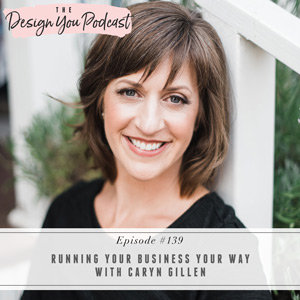
Happy Thanksgiving to my US listeners, it’s a strange one this year, right?! How many of us have said, “I cannot wait for this year to be over”? Usually, around this time of year, I do some deep reflection about my life and business and begin to plan for the year ahead. Today’s guest is the perfect guest to help us all reflect on our lives, review our businesses, and see whether we’re living a life we truly love.
Caryn Gillen is a life and business coach for entrepreneurs. She helps them build businesses they love, and love running so they can have more fun, help more people – and of course – make more money. She’s here today to show us how to stop living by the rules we impose on ourselves, and get back to living and working in alignment with our values.
Join us on the podcast this week to learn how to become more in-tune with your values and why it takes intention to create the business you really want. We’re discussing why being successful doesn’t always have to feel difficult and why you can make your own rules based on what works for you. Remember, running your own business means that you can do it your way, and it can be fun!
If you want to do some of this work in the way I’m doing it, then check out my year-end review. It’s an amazing little tool to help you look at what this year has been like for you and where you want to go next.
If you want help in creating financial freedom and building a business that’s fun and thriving, get on over to the Design You Coaching Program! We only enroll a few times a year, so be sure to sign up for the waiting list ASAP to be notified when we next open our doors!





